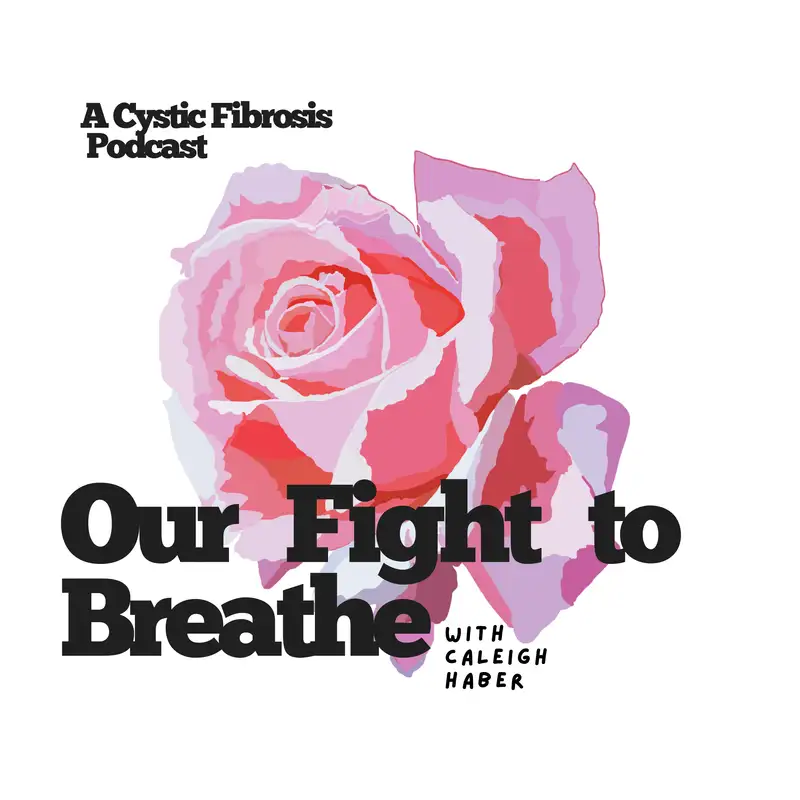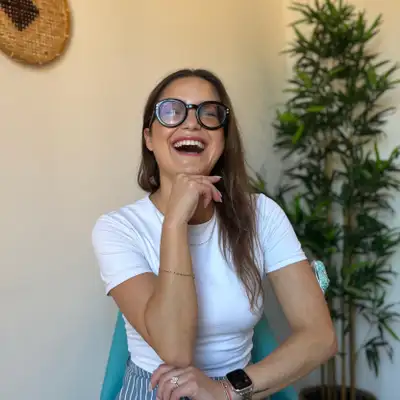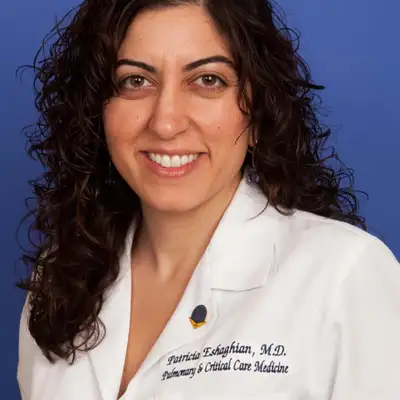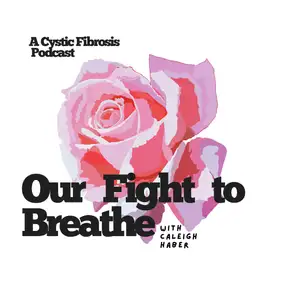
The Importance of Specialized CF Care
Transcription
Caleigh (Host):
Welcome to Our Fight to Breathe, a podcast rooted in resilience, community and the power of storytelling. My name is Caleigh Haber and I'm so glad you're here. I was born with cystic fibrosis, a progressive, genetic, rare disease that affects the lungs and digestive system. I've undergone two double lung transplants, spent years navigating the healthcare system, and have lived through moments I wasn't sure I'd survive. But through it all, one thing has kept me going Community. The fierce, brilliant and brave voices of others who know what it means to fight for every breath. This podcast was born from that fight.
Our Fight to Breathe is a space to elevate the voices of people living with chronic illness, disability and rare disease. It's a space where we talk about the realities of what we face and the triumphs and the grief, the injustice and the joy, the medical complexities and the very human stories behind them. Each episode will feature guests from all corners of the CF and medical world, from patients and caregivers to healthcare professionals and advocates. Together, we'll explore not just what it means to survive, but what it means to truly live. My hope is that you'll walk away from each episode feeling seen, understood and a little less alone. Whether you're navigating this life yourself or you're here to learn, listen or support someone you love, this podcast is for you. Thank you for being here. Let's keep fighting together.
Today's episode focuses on the importance of specialized cystic fibrosis care centers.
We'll explore how these centers provide comprehensive and tailored health care, significantly improving outcomes for people with cystic fibrosis. We'll share compelling patient success stories that highlight the profound impact specialized care has on health and quality of life. Finally, we'll offer advice on navigating the healthcare system and advocating for oneself or a loved one. Our mission with our Fight to Breathe is to offer a platform for people to voice their opinions in an accepting and non judgmental atmosphere. We want to foster a sense of belonging and support, offering insights, sharing experiences and amplifying the voices within the cystic fibrosis community. Each episode will bring you closer to understanding the realities of living with cystic fibrosis while also highlighting the strength, resilience and hope that bind us all together.
Now, let's jump into the episode.
Today I'm honored to introduce my personal cystic fibrosis physician, Dr. Patricia Eshaghian. Dr. Eshaghian is a leading specialist in cystic fibrosis care with more than 20 years of experience in managing and treating cystic fibrosis. She's currently the director of the cystic fibrosis program at UCLA Health. And I can say in total confidence she has been a beacon of hope and support for patients, including myself, providing personalized and comprehensive care that has made a significant difference in our lives. Welcome to the RFide to Breathe podcast, Dr. Patricia Eshaghian.
Dr. Patricia Eshaghian (Director and Physician of Cystic Fibrosis Accredited Center, UCLA):
Thanks so much, Caleigh, and thank you for having me here today with you. So I'm Dr. Eshaghian, like you mentioned. I'm the director of the adult cystic fibrosis program at ucla. I have some wonderful colleagues who work with me as well as a wonderful multidisciplinary team at ucla. I am excited to talk to you today about cystic fibrosis and specifically why specialized care and being seen at a CF center is so important. And I think that cystic fibrosis care has changed in the last 20 years, and it is also part of why it's so important to be seen at an accredited CF center.
Caleigh (Host):
What drew you to specializing and treating cystic fibrosis patients?
Dr. Patricia Eshaghian (Director and Physician of Cystic Fibrosis Accredited Center, UCLA):
So that is a great question. I actually didn't know so much about CF when I was in my training, and I really thought of CF as a pediatric disease. When I was in medical school, this really was a disease of children. And as you know, I'm an adult physician who trained internal medicine and then went on to train both pulmonary and critical care medicine. And in my fellowship training, I saw a few individuals living with cf, and they were younger than most of the people that I cared for, and they really just inspired me with their, you know, their tenacity, their bravery, and their fight to sort of survive and go on living with a genetic condition that was quite debilitating.
And I had the opportunity actually to go to Ireland as part of my CF training and spend some time training in Ireland at a cystic fibrosis center. Ireland does have a high percentage of individuals living with cf, and that gave me more exposure to the condition, to the disease, how to manage it, and really inspired me then to come back to UCLA and try to build a program at UCLA, because we really didn't have a cystic fibrosis center at UCLA 20 years ago. And so I had the opportunity to partner with my pediatric colleagues, my pediatric pulmonary colleagues, and we built a center from the ground up, caring for both children and adults living with cf. And it's been incredibly rewarding. It's been an incredible learning experience.
And I think while I'm a pulmonologist, by training, it also still allowed me to do what I love, which is caring for people from head toe. And as you know, CF doesn't just affect the lungs, it affects the entire body from literally head toe. And not just physical, but mental health as well. And so all of those things are so important. I love working with a team to care for the individuals that I care for. It's not just me, but I have a wonderful team that helps care for people living with cf. And I think that the comprehensive nature of care that we could provide just really brings me so much joy. And I also liked that.
I think individuals living with CF understand that their connection with their CF team and their CF doctor is probably a bit different than their connection with everybody else, because we are the specialists who understand and know how to treat their condition. And so being able to be that person that gets that special relationship with people, I love that.
Caleigh (Host):
So that's incredible. Can you talk more about how the process of becoming a certified cystic fibrosis accredited center happens? Is there a standardized process or what was your experience in building the center?
Dr. Patricia Eshaghian (Director and Physician of Cystic Fibrosis Accredited Center, UCLA):
So there is a standardized process. And kudos to the Cystic Fibrosis foundation for creating kind of a care center network so many years ago to allow for people to be provided with the proper care. And so the Cystic Fibrosis foundation requires that we have the ability to run the proper cultures on sputum, that we have the ability to run sweat tests which cannot be run everywhere, that we have the additional subspecialist that someone living with cystic fibrosis may need available to them, that we provide care that is in accordance with the guidelines that they publish and have researched and put out to care for individuals living with CF in both the outpatient and inpatient setting. They also hope that by having a care center network that people work together, which we do.
And so, as you know, I know specialists at other centers, not just those at ucla, all around the world. And that we have the ability to work together because that's how we can do research and both drug development and get to where we are today, where we have so many more treatment options than we did even 20 years ago for people living with CF. And so they also want to know that we know what we're doing right and so that we're providing the proper care to people living with cf. So, Caleigh, even in today's day and age, I diagnose adults with cystic fibrosis. And other doctors have told them, you don't have CF or You can't have cf. That can't be maybe because of the color of your skin or because you're overweight and not underweight.
And those are all incorrect assumptions because those doctors may not be as well educated in this disease as a doctor who has specialized in cystic fibrosis. And so just a few weeks ago, I diagnosed a 43 year old man with CF that even people at doctors at UCLA in my own division were kind of shocked and hadn't thought of this diagnosis. An individual living with this condition should absolutely choose to be seen by a team of doctors, nurses, social workers, psychologists who understand and know how to care for, diagnose, treat the condition. Right. And to the same token, if somebody else has a disease that I'm not well educated in, like say pulmonary hypertension, they shouldn't come see me for that condition. They should see one of my colleagues who is an expert in that condition. Right?
And so it took the time to learn about the genetics, learn about the different manifestations, the different presentations of what cystic fibrosis can look like. It's not always what people read about in a textbook in medical school. The disease can look different in a different individual. And the other component that I think is so important is that not everyone should be treated exactly identically, the same who's living in cystic fibrosis. That's, you know, it's. You mentioned that we provide individualized care, but yes, we all want to provide the care that's appropriate for you. And what's appropriate for you may not be the same as what's appropriate for someone else living with cf.
Caleigh (Host):
So absolutely, you're hitting so many things like on the head, on the nose. I'm not sure how you say it, but actually when I was growing up, I myself didn't know other people living with cystic fibrosis who were adults. When I first went into an adult center, that's really my first introduction into other patients living with CF into their adult years. Recently this year, I was actually shocked because I joined a patient support group. And that's when I saw that everybody except me was over the age of 55. And I was just amazed, you know, hearing the stories of people who were misdiagnosed, the treatment that they were undergoing while this whole time they had cystic fibrosis was quite shocking to me. And to me I'm thinking, how do people live that long without getting the proper treatment?
Because I myself had suffered a very critical end stage disease at such a young age. So I commend you for all that you're achieving with your program at, you know, at ucla. Having an accredited center, that is a lot to achieve. Do you hope to achieve more as your career continues?
Dr. Patricia Eshaghian (Director and Physician of Cystic Fibrosis Accredited Center, UCLA):
Well, I think for us at our center, the focus was really building the clinical program for the first 10, 15 years and really building our clinical care and the care that we provide and our team and gaining more and more expertise and so working with them to help support patients who are undergoing lung transplantation as well. I think the next step for our center personally is to now build the research infrastructure and participate in more and more research. And I think, you know a little bit of that because you participated in one of our clinical research studies. So thank you so much for participating. I think that, you know, research is so important. It's the job for CF is not done with the newer drugs that we have.
And I think, you know that there's been a lot of excitement since 2019 in the CF world due to the newest CFTR modulator, a combination of elexacaftor, tezacaftor and ivacaftor, or what's called trikafta on the market, which is available to about 90, a little 90 plus percent now of people living with CF, originally only to adults, but now is available to children age 2 and up. The CFTR modulator drugs, which is what those drugs are called, came onto the market in, I want to say, 2012. Now I'm forgetting, and since then have only improved in how many people they can treat and how many people we can use the medication on and how much of a quality of life improvement they can provide for people.
And we also feel that, you know, they are going to extend life for individuals and have already seen them living with cf. And so I think that the way that we got these medications is research. Right. And so the next step for us at our center is participating more in research. And there are still, you know, a good 8 to 10% of people who are not eligible for these drugs. And so I know that our mission, along with the CF Foundation's mission, is to cure CF and to have therapy for everyone living with the disease.
Creators and Guests


